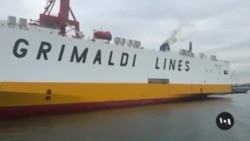ວໍຊິງຕັນ ພວມເພີ້ມການດຳເນີນຄວາມພະຍາຍາມໃນການບັງຄັບໃຊ້ການລົງໂທດຕໍ່ຣັດເຊຍ ຊຶ່ງໝາຍຄວາມວ່າ ເພື່ອຍຸຕິບໍ່ໃຫ້ເທີກີ ຊ່ວຍເຫຼືອມົສກູແລະຄູ່ການຄ້າ ຫຼີກລ່ຽງການຈຳກັດຮັດແຄບທາງດ້ານການຄ້າກ່ຽວກັບສົງຄາມໃນຢູເຄຣນ. ດັ່ງທີ່ດໍຣຽນ ໂຈນສ໌ ມີລາຍງານຈາກອິສຕັນບູລ ພວກນັກວິເຄາະ ກ່າວວ່າ ຄວາມສຳເລັດຫຼືລົ້ມແຫຼວໃນການລົງໂທດ ແມ່ນຂຶ້ນຢູ່ກັບວ່າ ປະເທດ ຕ່າງໆຈະສູນເສຍໜ້ອຍຫຼາຍປານໃດຈາກຂໍ້ຈຳກັດຮັດແຄບທາງດ້ານການຄ້າທີ່ເຊື່ອມໂຍງກັບຣັດເຊຍ. ໄພສານ ຈະນຳເອົາລາຍລະອຽດ ມາສະເໜີທ່ານ ໃນອັນດັບຕໍ່ໄປ:
ກຳປ່ັນແກຣນເດ ອີຕາເລຍ ຈອດແວ່ຢ້ຽມຢາມຢູ່ເປັນປະຈຳຕໍ່ທ່າເຮືອຂອງເທີກີ ເພື່ອຂົນສົ່ງລົດອີຕາລີ ໄປທີ່ນັ້ນ. ດັ່ງດຽວກັນກັບຫຼາຍໆປະເທດໃນຢູໂຣບ ຄວາມສຳພັນທາງດ້ານການຄ້າ ລະຫວ່າງອີຕາລີກັບເທີກີ ໄດ້ເພີ້ມທະວີຂຶ້ນ ນັບແຕ່ສົງຄາມໄດ້ເລີ້ມຂຶ້ນໃນຢູເຄຣນພ້ອມກັບໆກັບການເພີ້ມທະວີຂຶ້ນຂອງການຄ້າລະຫວ່າງຣັດເຊຍ ກັບເທີກີ.
ເທີກີໄດ້ສ້າງຊ່ອງທາງເພື່ອຫຼີກເວັ້ນການລົງໂທດ ທີ່ອັງກາຣາກ່າວວ່າ ຕົນບໍ່ໄດ້ຖືກຜູກໝັດໂດຍຂໍ້ຈຳກັດຕ່າງໆ.
ນັກຊ່ຽວຊານດ້ານຕະຫຼາດພະລັງງານຣັດເຊຍ ທ່ານນາງທາທີອານາ ມີໂຕຣວາ ແມ່ນສາສະດາຈານທີ່ໄປຢ້ຽມຢາມ ສະຖາບັນກິດຈະການລະຫວ່າງປະເທດທີ່ນະຄອນຫຼວງປາຣີ ກ່າວຜ່ານຊູມວ່າ:
“ເທີກີ ຊຶ່ງຍັງເປັນຜູ້ຮັບເອົາແກັສລາຍສຳຄັນຂອງຣັດເຊຍແລະຍັງເປັນປາຍທາງທີ່ສຳຄັນສຳລັບຜະລິດຕະພັນນ້ຳມັນດິບ ແລະປຣີໂຕລຽມຂອງຣັດເຊຍ ຊຶ່ງທີ່ຈິງແລ້ວແມ່ນປະຕູສຳລັບການໂອນເງິນຫຼາຍຢ່າງ ການສະໜອງອຸບປະກອນ ແລະສິ່ງອື່ນໆອີກຫຼາຍຢ່າງໃຫ້ຣັດເຊຍ.”
ບັນດາປະເທດເພື່ອນບ້ານ ຫຼາຍໆປະເທດຂອງຣັດເຊຍ ກໍໄດ້ບັນທຶກການເພີ້ມຂຶ້ນທີ່ຄ້າຍຄືກັນນີ້ ໃນການຄ້າສອງຝ່າຍກັບປະເທດຕ່າງໆໃນຢູໂຣບ ນັບແຕ່ໄດ້ມີການລົງໂທດຕໍ່ຣັດເຊຍ.
ທ່ານມຸສຕາຟາ ເອດິນ ຈາກສະພາຄວາມສຳພັນລະຫວ່າງປະເທດຂອງເທີກີໃຫ້ການອະທິບາຍວ່າ ເປັນຫຍັງບາງປະເທດຈຶ່ງບໍ່ເອົາຫົວຊາການດຳເນີນຄວາມພະຍາຍາມເພື່ອຈະກົດດັນຣັດເຊຍ ຊຶ່ງທ່ານກ່າວວ່າ:
“ມັນແມ່ນຜົນປະໂຫຍດຂອງຊາດ. ບັນດາປະເທດທີ່ອາດຈະຊື້ຜະລິດຕະພັນນ້ຳມັນຂອງຣັດເຊຍ ແຕ່ພວກເຂົາເຈົ້າກໍສາມາດຕ້ອງຕິ ປະເທດຕ່າງໆທີ່ກາຍເປັນຊ່ອງທາງສຳລັບການຄ້າດັ່ງກ່າວແລະກໍຍັງສືບຕໍ່ກ່າວຫາເທີກີວ່າຫຼົບຫຼີກການລົງໂທດ. ດັ່ງນັ້ນ ຂ້າພະເຈົ້າເຂົ້າໃຈວ່າ ນີ້ແມ່ນສະພາບການໂຕຈິງ ແລະມັນເກີດຂຶ້ນ. ໃນກໍລະນີນັ້ນ ຄຳຖາມກໍມີຢູ່ວ່າ ບັນດາປະເທດເຫຼົ່ານີ້ ຢູໂຣບແລະສະຫະລັດ ຈະເຮັດໃຫ້ການລົງໂທດເຄັ່ງຄັດຂຶ້ນກວ່າເກົ່າຫຼືບໍ່?”
ໃນເດືອນແລ້ວ ປະທານາທິບໍດີໂຈ ໄບເດັນ ໄດ້ລົງນາມໃນດຳລັດສະບັບນຶ່ງສັ່ງໃຫ້ອະນຸມັດການລົງໂທດຂັ້ນທີສອງ ທີ່ແນເປົ້າໝາຍໃສ່ສະຖາບັນການເງິນເຮັດທຸລະກີດກັບຣັດເຊຍ.
ທ່ານເມສຸດ ຄາຊິນ ແມ່ນທີ່ປຶກສາປະທານາທິບໍດີ ຢູ່ມະຫາວິທະຍາໄລເຢດິດເທເປ ໃນນະຄອນອິສຕັນບູລ ຊຶ່ງທ່ານກ່າວກ່ຽວກັບເລື້ອງນີ້ວ່າ:
“ຣັດເຊຍແມ່ນໄດ້ຮັບຜົນປະໂຫຍດຈາກສະຖານະການນີ້. ເປັນຫຍັງ? ຣັດເຊຍໄດ້ຂາຍນ້ຳມັນແລະແກັສໃຫ້ແກ່ອິນເດຍ ຈີນ ແລະແມ່ນກະທັງພັນທະມິດໃນຢູໂຣບຫຼາຍໆປະເທດ;”
ຜູ້ນຳຂອງເທີກີເຊື່ອວ່າ ຕົນໄດ້ປະຕິເສດຕໍ່ການບັງຄັບໃຊ້ການລົງໂທດ ຍັງອະນຸຍາດໃຫ້ຕົນໄດ້ຫຼິ້ນບົດບາດເປັນຜູ້ໄກ່ເກ່ຍ ລະຫວ່າງຣັດເຊຍ ແລະຢູເຄຣນ. ແຕ່ພວກນັກວິເຄາະກ່າວວ່າ ອັງກາຣາຍັງກາງຕໍ່ຄວາມຫວັງທີ່ວ່າບັນດາປະເທດພັນທະມິດຕາເວັນຕົກ ຈະຖືເອົາຜົນປະໂຫຍດທາງດ້ານເສດຖະກິດຂອງເຂົາເຈົ້າມາກ່ອນ ແລະດ້ວຍເຫດນັ້ນ ລົງຄະແນນສຽງຄັດຄ້ານຕໍ່ການລົງໂທດເພີ້ມຕື່ມ.
ນັ້ນແມ່ນການຊັ່ງຊາຂອງທ່ານມຸສຕາຟາ ອາຍດິນ ຈາກສະພາຄວາມສຳພັນລະຫວ່າງປະເທດຂອງເທີກີ ຊຶ່ງທ່ານກ່າວກ່ຽວກັບເລື້ອງນີ້ວ່າ:
“ຖ້າພວກເຂົາເຈົ້າຫາກເຮັດແບບນີ້ ພວກເຂົາເຈົ້າບໍ່ພຽງແຕ່ ຈະສ້າງຄວາມເສຍຫາຍໃຫ້ແກ່ເທີກີ ຫຼືປະເທດອື່ນໆເທົ່ານັ້ນ ພວກເຂົາເຈົ້າຈະສ້າງຄວາມເສຍຫາຍໃຫ້ແກ່ໂຕເອງນຳ ແລະເສດຖະກິດຂອງພວກເຂົາເຈົ້າ ດັ່ງນັ້ນ ພວກເຂົາເຈົ້າຈຶ່ງຫຼີກລ້ຽງບໍ່ເຮັດສິ່ງນີ້.
ໃນເວລານີ້ ຍັງບໍ່ມີຮ່ອງຮອຍໃດໆທີ່ສະແດງໃຫ້ເຫັນເຖິງການຊັກຊ້າລົງ ຂອງທ່າກຳປັ່ນ ແລະເຂດນ່ານນ້ຳຂອງເທີກີ ໃນຂະນະທີ່ການຄ້າຍັງສືບຕໍ່ມີການຂະຫຍາຍໂຕ ລະຫວ່າງເທີກີກັບຢູໂຣບແລະເທີກີກັບຣັດເຊຍ ທັງໆທີ່ໄດ້ມີການດຳເນີນຄວາມພະຍາຍາມຂອງລະຫວ່າງປະເທດເພື່ອຈະຄວບຄຸມການລົງໂທດໃນດ້ານເສດຖະກິດໃຫ້ເຂັ້ມງວດຕື່ມຂຶ້ນຕໍ່ມົສກູນັ້ນ.
Washington is stepping up its efforts to enforce sanctions against Russia with secondary sanctions meant to stop Turkey from helping Moscow and its trading partners circumvent trade restrictions over the war in Ukraine. As Dorian Jones reports from Istanbul, analysts say the success or failure of the sanctions will depend on how much nations stand to lose by restricting commercial links with Russia.
The Grande Italia is a regular visitor to Turkish ports, delivering Italian cars. As with several European countries, bilateral trade between Italy and Turkey has surged since the onset of the war in Ukraine, with a corresponding increase in Russian-Turkish trade.
Turkey has been a conduit to circumvent sanctions, with Ankara saying it is not bound by the restrictions.
Russia energy market specialist Tatiana Mitrova is a visiting professor at the Paris School of International Affairs: (via zoom)
“Turkey, which is still a significant taker of Russian gas, and which is an important destination for Russian crude and petroleum products, which is frankly a gateway for many financial transactions, supplies of equipment and everything else to Russia.”
Many of Russia's neighbors have also recorded similar surges in bilateral trade with European countries since the imposition of sanctions against Russia.
Mustafa Aydin of the International Relations Council of Turkey explains why some nations have in effect ignored efforts to pressure Russia.:
“It's about national interest. The countries who themselves might buy Russian oil products, but they also can criticize the countries who are becoming a conduit for that trade and keep accusing Turkey of sanction evasion. So, I can understand that this is the reality, and it happens. In that case, the question is whether these countries, the Europe and the United States, would go for a tightening of sanctions.”
Last month, U.S. President Joe Biden signed an executive order approving secondary sanctions that target financial institutions doing business with Russia.
The measures may hurt a Turkish economy that’s already suffering.
Ankara says the sanctions are failing.
Mesut Casin is a presidential adviser at Istanbul’s Yeditepe University:
“Russia is benefiting [from] this situation. Why? Russia is giving oil and gas to India, China, even [to] many European allies.”
Turkey’s leadership believes its refusal to enforce sanctions also allows it to play a mediating role between Russia and Ukraine. But analysts say Ankara is also relying on the hope that its Western allies will put their economic interests first and thus vote against more new sanctions.
That’s the assessment of Mustafa Aydin of the International Relations Council of Turkey:
“If they do this, they will not only hurt Turkey or other countries, they will hurt themselves and their economies, so they are avoiding this.”
For now, there are no signs of a slowdown at Turkey’s busy ports and waterways, as trade continues to boom between Europe and Turkey and Turkey and Russia, despite international efforts to tighten the economic noose on Moscow.






ຟໍຣັມສະແດງຄວາມຄິດເຫັນ